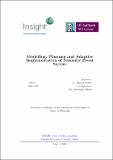| dc.contributor.advisor | Curry, Edward | |
| dc.contributor.author | Gao, Feng | |
| dc.date.accessioned | 2016-05-13T10:34:57Z | |
| dc.date.available | 2016-05-13T10:34:57Z | |
| dc.date.issued | 2016-05-13 | |
| dc.identifier.uri | http://hdl.handle.net/10379/5787 | |
| dc.description.abstract | Recent developments in sensor networks, social media, process management and data analysis envisions interlinked devices, people, processes and data, constituting an Internet-of-Everything. These networks can be used to help create systems that detect situations occuring in urban life and respond to those situations in a timely manner, so that smart decisions can be made for citizens, organisations, companies and city administrations.
Event processing is an important technique in developing Smart City applications that target detecting patterns in events captured at real-time. However, event processing faces many challenges in the context of creating Smart City applications and building the Internet-of-Everything, including integrating heterogeneous data sources and data interfaces, ensuring quality-of-service and providing an easy-to-use and easy-to-maintain platform. This thesis addresses these challenges by integrating Semantic Web, Service Oriented Architecture and Complex Event Processing techniques, realising a network of semantic complex event services. The modelling, planning and adaptive implementation of semantic event services are researched, with the objective of facilitating an efficient and effective management of the life-cycle of a semantic event service. Service composition algorithms based on pattern matchmaking are developed and evaluated. Experiments show that by leveraging an event service reusability index, the composition time for large repositories and complicated queries can be reduced significantly, making on-demand composition possible for scenarios with large solution spaces. Genetic algorithms are developed for optimising event service compositions with regard to quality-of-service metrics. The evaluation shows that the genetic algorithms are effective and scalable. Different quality-aware event service adaptation strategies are developed to recover the quality of the system at run-time. Experiments show that applying different adaptation strategies have trade-offs between adaptation efficiency and effectiveness.
The techniques are integrated in the Automatic Complex Event Implementation System, which serves as a middleware for handling activities in the life-cycle of semantic event services. A prototype of the system is developed and tested over different smart city application scenarios, based on both real data collected from the city of Aarhus as well as synthetic data. By addressing the requirements in real-world scenarios, the prototype demonstrates the validity and feasibility of the system. | en_IE |
| dc.rights | Attribution-NonCommercial-NoDerivs 3.0 Ireland | |
| dc.rights.uri | https://creativecommons.org/licenses/by-nc-nd/3.0/ie/ | |
| dc.subject | Complex event processing | en_IE |
| dc.subject | Service oriented architecture | en_IE |
| dc.subject | Internet of things | en_IE |
| dc.subject | Smart city | en_IE |
| dc.subject | Engineering and Informatics | en_IE |
| dc.subject | Semantic web | en_IE |
| dc.subject | Data analytics | en_IE |
| dc.title | Modelling, planning and adaptive implementation of semantic event service | en_IE |
| dc.type | Thesis | en_IE |
| dc.contributor.funder | Science Foundation Ireland (SFI) under grant No. SFI/12/RC/2289 | en_IE |
| dc.contributor.funder | EU FP7 CityPulse Project under grant No.603095 | en_IE |
| dc.local.note | The thesis explores the management of Semantic Event Service (SES) and their usage in Smart City applications, where real-time and large-scale federation of heterogeneous data streams are required. The study has investigated how to manage different activities within the life-cycle of SESs, namely the modelling, planning, implementation and adaptation phases. | en_IE |
| dc.local.final | Yes | en_IE |
| nui.item.downloads | 5875 | |


